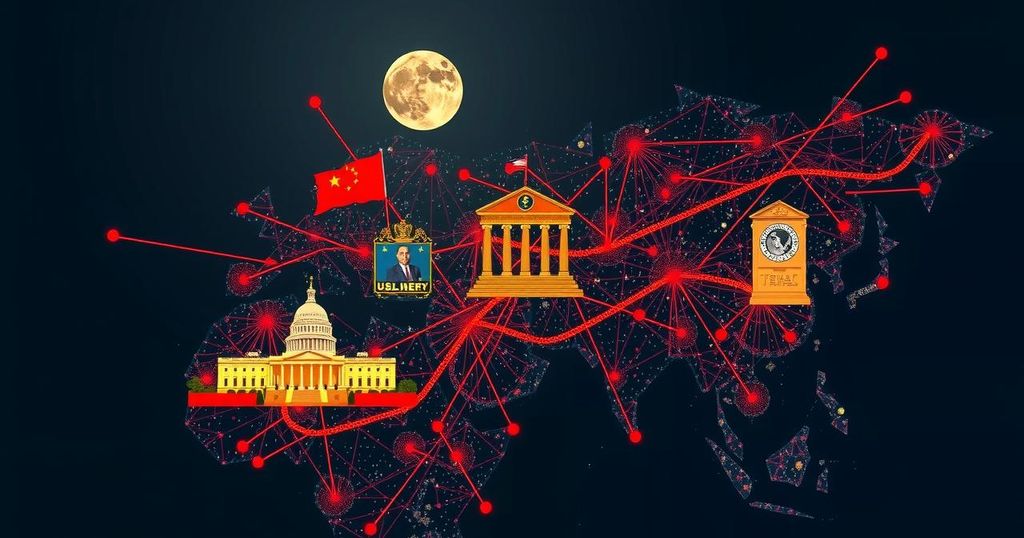World news
AMERICA, ASIA, BEIJING, BEIJING DAILY, CAPITOL HILL, CCTV, CHINA, CNN, DC, ELECTION, FOREIGN POLICY, GLOBAL TIMES, LI SHUO, MEDIA COVERAGE, MEXICO, NATIONAL SECURITY, NORTH AMERICA, NORTHERN MARIANA ISLANDS, OCEANIA, UNITED STATES, US, US-CHINA RELATIONS, WASHINGTON, WASHINGTON, DC, WEIBO, WHITE HOUSE, XI JINPING
David O'Sullivan
0 Comments
Chinese State Media Highlights U.S. Divisions Amid Election Uncertainty
Chinese state media emphasizes U.S. political divisions during election day, suggesting inevitable unrest and asserting that tensions between the U.S. and China will persist regardless of the election outcome. The portrayal of American democracy as fractured serves to critique the U.S. while reinforcing China’s own political narrative under Xi Jinping.
As the United States awaits election outcomes, Chinese state media is emphasizing the existing political divisions within the country and suggesting potential turmoil following the votes. Under the leadership of Xi Jinping, Chinese media has increasingly mocked the American democratic framework, especially in light of criticism directed towards China’s own one-party system. Reports from outlets like Global Times and CCTV highlight concerns over unrest, while downplaying the peaceful voting activities occurring across the nation. The portrayal of American voting as fraught with division serves to reinforce a narrative of dysfunction in democracy amidst fears of violence on election day. On social media platforms in China, comments reflect a perception that irrespective of the election outcome, bilateral relations will remain strained, with many believing that both candidates would uphold policies aimed at curbing China’s influence globally. From tariffs instituted during Donald Trump’s administration to President Biden’s ongoing concerns regarding national security and technology sectors, there is a prevailing sentiment that the U.S. administration’s stance towards China is unlikely to change significantly. Amidst election-related discussions, sentiments on Chinese platforms suggest a nonchalant approach towards the election results, with one Beijing resident remarking that either winning candidate would yield similar foreign policies towards China. This perspective reflects a broader consensus among individuals in China that the trajectory of U.S.-China relations has been set, regardless of the political landscape following the elections. In summary, as American citizens engage in the electoral process, Chinese media takes the opportunity to spotlight divisions within the U.S., which they interpret as a sign of weakness in the face of international scrutiny. The narratives crafted by Chinese state media not only serve to criticize American democracy but also strengthen the resolve of Chinese citizens in their own political contexts.
The article discusses the response of Chinese state media to the U.S. elections, illustrating how such media outlets leverage the situation to emphasize political divisions and potential unrest in America. The context includes China’s long-standing critique of Western democratic principles, particularly as they pertain to its own one-party rule under Xi Jinping. Amidst growing tensions and competition between the two nations, the portrayal of the U.S. election is intended to highlight perceived flaws in the American political system, while reinforcing existing narratives about China’s stability and governance.
In conclusion, as America navigates the complexities of its electoral process, Chinese state media utilizes this moment to underscore perceived divisions and instabilities within the U.S. political system. The overarching narrative communicated to Chinese citizens suggests that, regardless of who emerges victorious, relations with the United States will remain characterized by contention and mutual suspicion, reflecting a consensus that both candidates are unlikely to alter the trajectory of U.S.-China relations significantly.
Original Source: www.cnn.com




Post Comment